Driving Sustainable Manufacturing in Food and Beverage
As sustainability continues to shape the future of manufacturing, the food and beverage (F&B) industry is uniquely positioned to benefit from greener, more efficient practices. Consumers are demanding eco-conscious products, regulators are tightening environmental standards, and businesses are under increasing pressure to reduce their carbon footprint.
For Operations Directors in F&B manufacturing, these dynamics underscore the need for sustainability-driven transformation across production, supply chain, and operations.
One powerful way to achieve this is through strategic integration of advanced planning systems like PlanetTogether with ERP platforms such as SAP, Oracle, Microsoft Dynamics, Kinaxis, or Aveva. Integrating these systems can create a seamless flow of data and insights that empower manufacturers to implement sustainable practices while meeting production targets and ensuring product quality.
In this blog, we’ll explore how PlanetTogether, integrated with ERP solutions, can drive sustainable manufacturing in the F&B sector and address the key challenges that Operations Directors face in today’s sustainability-focused landscape.
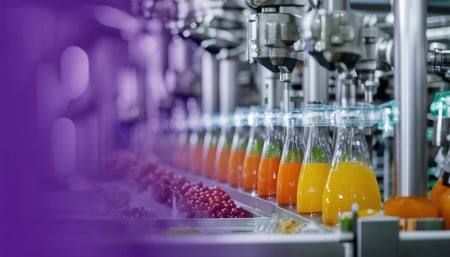
Aligning Production Planning with Sustainability Goals
Sustainable manufacturing begins with sustainable planning. Operations Directors need the ability to balance resource availability with production demands in a way that minimizes waste and reduces energy consumption. PlanetTogether, integrated with ERP systems, enables real-time insights into production scheduling, inventory, and resource allocation, making it easier to align daily operations with sustainability goals.
For instance, an integrated system can prioritize production runs that minimize machine changeovers, reducing both energy consumption and raw material waste. By synchronizing production schedules and inventory levels, Operations Directors can ensure they’re using materials more efficiently and avoiding the costs—both financial and environmental—of excess inventory.
Case Example:
An F&B manufacturer might use PlanetTogether in conjunction with SAP’s inventory and production modules to create schedules that optimize energy usage. By aligning peak production periods with lower energy costs and availability, the facility can reduce overall energy consumption and meet sustainability goals without compromising productivity.
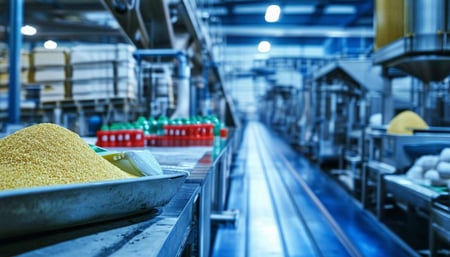
Enhancing Supply Chain Visibility to Reduce Waste
Supply chain transparency is critical in sustainable manufacturing. The food and beverage industry faces unique challenges, such as managing perishable goods and fluctuating demand, which often lead to wastage. Integrating PlanetTogether with ERP solutions like Kinaxis or Oracle provides the end-to-end visibility necessary to reduce waste at every stage of the supply chain.
With real-time data integration, an Operations Director can have a comprehensive view of materials flow, production schedules, and demand forecasts. This visibility allows for dynamic adjustments, ensuring that materials and products are used before they expire, and helping to avoid excess or understocking scenarios. Additionally, integrated systems can track and report carbon emissions at each stage of production, offering insights into where reductions can be made.
Case Example:
Using PlanetTogether and Kinaxis together, an Operations Director at an F&B facility can monitor inventory in real-time, reducing the likelihood of overproduction. For example, if demand data shows a dip, production can be slowed to avoid excess perishable stock, minimizing the environmental and financial costs of waste disposal.

Optimizing Energy Consumption with Predictive Maintenance
Energy efficiency is central to sustainable manufacturing, especially for energy-intensive industries like food and beverage. Predictive maintenance, facilitated by integrated systems, plays a crucial role in reducing energy consumption by keeping equipment in optimal condition and preventing unexpected downtime.
When PlanetTogether is integrated with an ERP system like Aveva, Operations Directors gain predictive maintenance capabilities that help preempt equipment failure and inefficiencies. These systems monitor equipment in real time and use predictive analytics to detect early signs of wear and tear, so maintenance can be scheduled before issues arise. As a result, equipment runs more efficiently, reducing the energy required per production unit and extending the life of machinery—key factors in sustainable manufacturing.
Case Example:
An F&B manufacturer using PlanetTogether with Aveva’s asset management module could set predictive maintenance schedules based on real-time usage data, reducing the need for emergency repairs. By maintaining machinery at optimal efficiency, the facility reduces energy waste and supports a more sustainable production process.
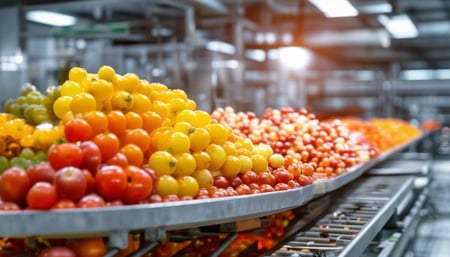
Streamlining Material Sourcing with Data-Driven Insights
Sustainable manufacturing isn’t only about reducing emissions within the plant; it also involves responsible sourcing of raw materials. ERP systems like Microsoft Dynamics, when integrated with PlanetTogether, provide data-driven insights that can help F&B manufacturers optimize sourcing, choosing suppliers that meet sustainability standards, reduce transportation distances, and lower the overall environmental impact of materials.
An integrated system allows Operations Directors to track and analyze the environmental footprint of materials sourced from various suppliers. With this information, they can make more informed decisions, such as favoring local suppliers to reduce transportation emissions or selecting vendors with verified sustainable practices.
Case Example:
Through PlanetTogether and Microsoft Dynamics, an Operations Director can assess supplier performance not only on cost and delivery time but also on sustainability metrics. For instance, if a local supplier with a smaller carbon footprint can meet quality standards, they might be preferred over an international vendor, reducing transport-related emissions.
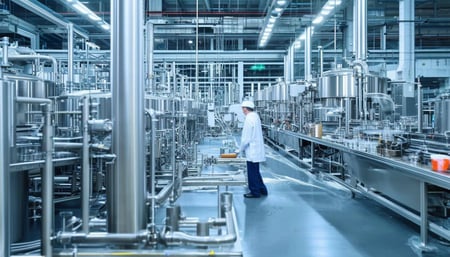
Enabling Closed-Loop Manufacturing with Circular Supply Chains
A growing trend in sustainable manufacturing is the concept of a circular supply chain, where materials are reused, recycled, or repurposed. An integrated system with PlanetTogether and SAP or Oracle can facilitate closed-loop manufacturing processes, allowing manufacturers to reclaim materials, manage byproducts, and turn waste into new resources.
For example, by integrating with SAP, PlanetTogether can help plan for byproduct reuse, turning what would otherwise be waste into valuable inputs for other processes. This integration enables more efficient tracking of byproducts and secondary materials, reducing overall waste and supporting a circular supply chain.
Case Example:
An F&B manufacturer might integrate PlanetTogether with SAP to manage waste products generated during production. By reclaiming usable materials—such as using organic waste for biofuel or animal feed—the facility not only reduces its waste disposal costs but also minimizes environmental impact, moving closer to a closed-loop system.
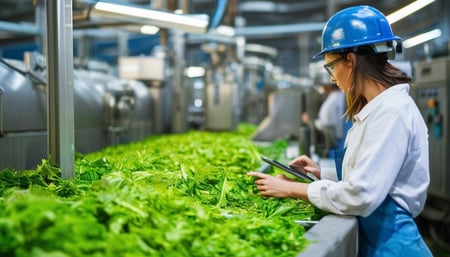
Monitoring and Reporting Sustainability Metrics for Continuous Improvement
Sustainable manufacturing requires continuous monitoring, evaluation, and adaptation. For Operations Directors, tracking progress against sustainability goals is essential to demonstrate accountability and identify areas for improvement. Integrated systems provide a robust platform for monitoring sustainability metrics, from energy consumption to waste levels, emissions, and resource efficiency.
When PlanetTogether is integrated with ERP platforms like SAP or Oracle, data is centralized, enabling comprehensive sustainability reporting. Operations Directors can access real-time dashboards that display metrics related to energy use, carbon emissions, waste generation, and more, making it easier to adjust operations to enhance sustainability outcomes. Moreover, automated reporting tools can help maintain compliance with environmental regulations by providing accurate, up-to-date records.
Case Example:
An F&B facility that integrates PlanetTogether with Oracle’s analytics platform can monitor its sustainability metrics in real-time, easily identifying trends or anomalies. If energy consumption spikes unexpectedly, for example, the system can alert the Operations Director to investigate, helping the facility stay aligned with sustainability targets.
The journey toward sustainable manufacturing is complex, especially in an industry as resource-intensive as food and beverage. However, by leveraging advanced systems integration—such as combining PlanetTogether with ERP solutions like SAP, Oracle, Microsoft Dynamics, Kinaxis, or Aveva—Operations Directors can drive meaningful changes that enhance efficiency, reduce environmental impact, and support a greener future.
These integrations provide Operations Directors with the tools to align production planning with sustainability goals, enhance supply chain visibility, optimize energy use, streamline material sourcing, implement circular supply chains, and monitor sustainability metrics—all of which contribute to sustainable manufacturing practices. As F&B manufacturers continue to face mounting environmental pressures and shifting consumer expectations, integrated systems will be indispensable in achieving sustainable, responsible production practices.
For Operations Directors, the time to adopt these integrated technologies is now. Sustainable manufacturing is not only a strategic imperative but also an opportunity to lead the industry in eco-conscious practices. By harnessing the full potential of PlanetTogether and ERP solutions, F&B facilities can produce high-quality products that meet consumer demands, comply with regulations, and leave a positive environmental legacy.
Are you ready to take your manufacturing operations to the next level? Contact us today to learn more about how PlanetTogether and integrated scheduling solutions can help you achieve your sustainability goals and drive success in the food and beverage industry.
Topics: PlanetTogether Software, Integrating PlanetTogether, Continuous Improvement, Food and Beverage Manufacturing, Circular Supply Chains, Monitoring and Reporting Sustainability Metrics, Enabling Closed-Loop Manufacturing







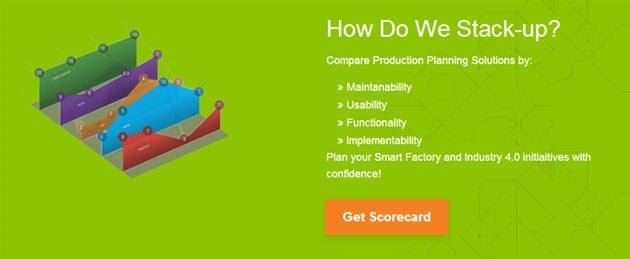


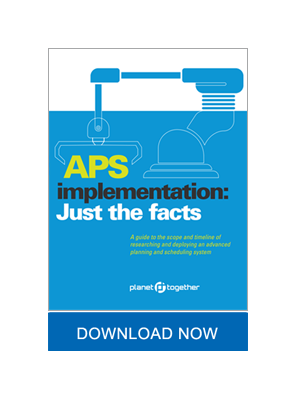
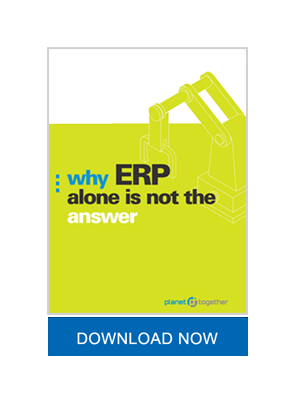







LEAVE A COMMENT